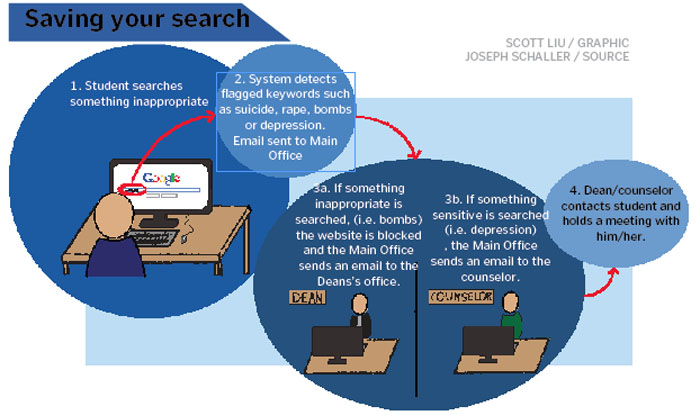Counselors can now reach out to students who may need help or support instead of students coming to them due to the installment of a new internet monitoring system. Implemented during the second semester of the 2012-2013 school year, the new system recognizes the use of specific keywords, like “depression” or “weapons,” in order to bring certain students to the attention of counselors.
 In the past, the school used a system that blocked inappropriate websites. However, with the availability of better technology, the administrators have enhanced the security. Now, certain keywords trigger a response, sending emails that report the visit to the material. These reports provide an analysis of what was searched and for how long it was viewed, deciding if the student should meet with a counselor.
In the past, the school used a system that blocked inappropriate websites. However, with the availability of better technology, the administrators have enhanced the security. Now, certain keywords trigger a response, sending emails that report the visit to the material. These reports provide an analysis of what was searched and for how long it was viewed, deciding if the student should meet with a counselor.
Assistant principal Joseph Schaller provided reasoning for the improvements by saying that since the school provides internet use, it is also responsible for making sure the students use it safely.
Schaller said, “If (students) look up words like ‘suicide’ or ‘abuse,’ we have to be able to check up on them. This is different than if they search something that is not school appropriate. These searches aren’t meant to get anyone in trouble.”
This new approach has, at times, caused counselors to call down students to their offices due to research papers or accidental searches on controversial topics, but even students recognize its importance while also harboring mixed feelings.
Senior Rachel Krieger said, “If I were a student who was contacted by a counselor because of their search-tracking, I’d be glad the counselor cared so much, but also feel like my privacy had been violated a little bit.”
However, since the new security has been put in place, counselors have been able to meet with students who need their aid. A single visit with a counselor over a search has led to more meetings in the past. The monitoring has allowed students who do not necessarily feel comfortable with directly approaching counselors to meet with someone who can help them.
“Suicidal thoughts, domestic abuse and different drug searches have been reason for concern,” Schaller said.
While the system itself has no repercussions in place if a student triggers a word, the improved internet security addresses concerns administration may have relating to a student, according to Tricia Reynolds, the Community Relations Coordinator of Carmel Clay Schools.
“We hope and believe that our student body is very respectful and has already been aware of the policy and follows the rules from the school,” Reynolds said. “I do not think anything should change regarding what students search online.”




























![Keep the New Gloves: Fighter Safety Is Non-Negotiable [opinion]](https://hilite.org/wp-content/uploads/2024/12/ufcglovescolumncover-1200x471.png)















































![Review: "Abbott Elementary", a show I can watch with my family and truly enjoy [MUSE]](https://hilite.org/wp-content/uploads/2024/12/unnamed-1.png)
![Review: “We Live in Time” leaves you wanting more [MUSE]](https://hilite.org/wp-content/uploads/2024/12/IMG_6358.jpg)
![Review: The premise of "Culinary Class Wars" is refreshingly unique and deserving of more attention [MUSE]](https://hilite.org/wp-content/uploads/2024/12/MUSE-class-wars-cover-2.png)
![Introducing: "The Muses Who Stole Christmas," a collection of reviews for you to follow through winter [MUSE]](https://hilite.org/wp-content/uploads/2024/12/winter-muse-4.gif)
![Review: "Meet Me Next Christmas" is a cheesy and predictable watch, but it was worth every minute [MUSE]](https://hilite.org/wp-content/uploads/2024/11/AAAAQVfRG2gwEuLhXTGm3856HuX2MTNs31Ok7fGgIVCoZbyeugVs1F4DZs-DgP0XadTDrnXHlbQo4DerjRXand9H1JKPM06cENmLl2RsINud2DMqIHzpXFS2n4zOkL3dr5m5i0nIVb3Cu3ataT_W2zGeDAJNd_E-1200x884.jpg)
![Review in Print: Maripaz Villar brings a delightfully unique style to the world of WEBTOON [MUSE]](https://hilite.org/wp-content/uploads/2023/12/maripazcover-1200x960.jpg)
![Review: “The Sword of Kaigen” is a masterpiece [MUSE]](https://hilite.org/wp-content/uploads/2023/11/Screenshot-2023-11-26-201051.png)
![Review: Gateron Oil Kings, great linear switches, okay price [MUSE]](https://hilite.org/wp-content/uploads/2023/11/Screenshot-2023-11-26-200553.png)
![Review: “A Haunting in Venice” is a significant improvement from other Agatha Christie adaptations [MUSE]](https://hilite.org/wp-content/uploads/2023/11/e7ee2938a6d422669771bce6d8088521.jpg)
![Review: A Thanksgiving story from elementary school, still just as interesting [MUSE]](https://hilite.org/wp-content/uploads/2023/11/Screenshot-2023-11-26-195514-987x1200.png)
![Review: "When I Fly Towards You", cute, uplifting youth drama [MUSE]](https://hilite.org/wp-content/uploads/2023/09/When-I-Fly-Towards-You-Chinese-drama.png)
![Postcards from Muse: Hawaii Travel Diary [MUSE]](https://hilite.org/wp-content/uploads/2023/09/My-project-1-1200x1200.jpg)
![Review: "Ladybug & Cat Noir: The Movie," departure from original show [MUSE]](https://hilite.org/wp-content/uploads/2023/09/Ladybug__Cat_Noir_-_The_Movie_poster.jpg)
![Review in Print: "Hidden Love" is the cute, uplifting drama everyone needs [MUSE]](https://hilite.org/wp-content/uploads/2023/09/hiddenlovecover-e1693597208225-1030x1200.png)
![Review in Print: "Heartstopper" is the heartwarming queer romance we all need [MUSE]](https://hilite.org/wp-content/uploads/2023/08/museheartstoppercover-1200x654.png)




